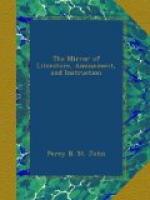Some days after this affair, Mr. G—— being grossly insulted by another French gentleman—a notorious duellist, and, if we mistake not, an ally of the deceased—felt himself obliged to notice the affront in a similar manner. Monsieur —— treated the challenge with supreme contempt, begged to assure Mr. G—— that he was a dead man if they met, but professed himself much at his service if he was really bent on quitting this world, and thought the most appropriate spot for so doing would be the Champs d’Elysees. Thither next morning the parties repaired. Mr. G—— found his antagonist already on the ground, and amusing himself by firing at a mark: viz.—his glove, attached to the branch of a tree, which he shot at with such precision as to send his bullet, at every successive trial, through the aperture in the glove made by the first. Monsieur was, in truth, a splendid and formidable marksman. Mr. G——, in preparing for the duel, happening to cast his eyes on his adversary, perceived that he had slily placed his arm in such a position, as must ensure, on the honourable gentleman’s fire, the fulfilment of his vaunt to make him “a dead man.” No time was to be lost; the young Englishman’s life depended upon dispatch; and, instantly firing, he proved himself as good a marksman as Monsieur ——, by sending his ball, with the utmost precision, through the wily manoeuvrer’s elbow, from whence it passed into his side; and he dropped down, disabled, if not dead. Thus did British spirit twice humble, in a remarkable manner, French insolence and presumption!
* * * * *
A DISTINCTION.
“La-a-dy * *,” exclaimed a certain Colonel, in that very original Scotch brogue which a long acquaintance with the world has not tended in any degree to diminish, “alloo me to introduce you to my brother, Carnal M—— ——.” “What!” asked the lady, “are you both Colonels?” “Oo—ay—La-a-dy * *, that are we, in troth; but the daff’rence is this, my brother, you see, is Carnal” (Lieutenant-colonel he intended to express), “and I—am fool Carnal!”
M.L.B.
* * * * *
MANNERS AND CUSTOMS.
PETER PENCE
Were an ancient levy, or tax, of a penny on each house throughout England, paid to the Pope. It was called Peter-pence because collected on the day of St. Peter ad vincula. By the Saxons it was called Rome-feoh—i.e. the fee of Rome; and also Rome-scot, and Rome-pennying, because collected and sent to Rome;—and lastly, it was called Hearth-money, because every dwelling-house was liable to it, provided there were thirty-pence vivae pecuniae belonging to it;—nay, and every religious house, the Abbey of St. Alban’s alone excepted.
This Peter-pence was at first given as a pension, or alms, by Ina, king of the West Saxons, in the year 727, being then in pilgrimage at Rome; and the like was done by Offa, king of the Mercians, throughout his dominions, in 794; and afterwards by Ethelwulph, through the whole kingdom, in the year 855.




